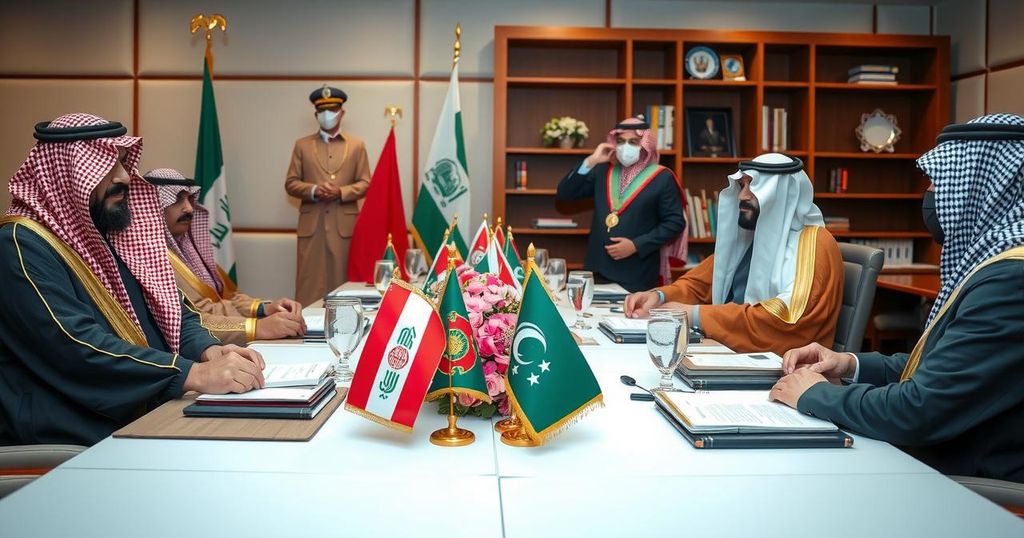Global news
AHMED ABOUL GHEIT, ANTONY J. BLINKEN, AQABA, ASIA, BASHAR AL - ASSAD, BLINK, BLINKEN, DIPLOMACY, EUROPE/ASIA, EUROPEAN UNION, GAZA CONFLICT, INTERNATIONAL RELATIONS, IRAN, LEBANON, MIDDLE EAST, NORTH AMERICA, NTV, REGIONAL SECURITY, RUSSIA, SYRIA, UNITED NATIONS, UNITED STATES
Marcus Li
0 Comments
Blinken Engages Arab Ministers on Syria’s Political Future Amidst Transition Challenges
Secretary of State Antony J. Blinken met with Arab foreign ministers in Jordan to discuss the political transition in Syria after Bashar al-Assad’s removal. The meeting focused on fostering a Syria-led process amidst rising regional concerns, especially from Turkey’s increasing influence and military operations. U.S. officials remain vigilant about potential instability affecting neighboring nations and the overall security environment.
Secretary of State Antony J. Blinken convened with Arab foreign ministers in Jordan to deliberate on facilitating a political transition in Syria following the recent ousting of President Bashar al-Assad. The meeting, which included representatives from Jordan, Saudi Arabia, Iraq, Lebanon, Egypt, and the Arab League, addressed the uncertain future under caretaker Prime Minister Mohammed al-Bashir. This development has caused celebrations in Syria amidst concerns for stability in a nation marred by years of conflict.
The discussions aimed to promote a Syria-led political process as the aftermath of Assad’s regime poses implications for regional dynamics involving Israel, Iran, and Lebanon, along with Russia’s vested interests. Turkey’s escalating influence was notably highlighted, as it seeks to reopen its embassy in Damascus and combat Kurdish militant groups perceived as threats. The Turkish foreign minister publicly targeted the YPG militia, indicating a strategic intent to dismantle its presence in Syria.
As the United States remains engaged in the region, there are rising apprehensions regarding potential instability that could extend beyond Syrian borders. The U.S. Central Command has also been closely monitoring developments, with inquiries into Israel’s recent military actions against perceived threats within Syria.
In conclusion, the outcome of Secretary Blinken’s discussions may significantly shape Syria’s political landscape while directly impacting the broader Middle East. The instability and changes in leadership at this juncture present both challenges and opportunities that regional powers must navigate meticulously, prioritizing peaceful transitions and international cooperation.
The article examines the geopolitical landscape following the sudden removal of Bashar al-Assad in Syria, a critical player in the Middle East for over a decade. The meeting led by Secretary Blinken in Jordan reflects the urgency among Arab ministers to address the resultant power vacuum and instability in Syria. This context also highlights Turkey’s growing assertiveness in the region and the continued strategic interests of the United States and Israel in having a stable neighbor. Furthermore, the historical ties between various Kurdish forces and the U.S. against the Islamic State illustrate the complex web of alliances that have formed in the aftermath of the Syrian civil war, which started in 2011. The current transition poses both opportunities for reform and risks of renewed conflict as external powers continue to influence the situation.
The meeting between Secretary Blinken and Arab ministers underscores the critical juncture Syria is experiencing following the fall of Assad. It highlights the necessity for a coordinated approach to support a political transition while managing the implications for regional stability. The emerging power dynamics, especially with Turkey’s assertiveness, indicate shifting alliances that may redefine the current geopolitical outlook in the Middle East. Continued vigilance and diplomatic efforts will be essential to navigate this complex landscape.
Original Source: www.nytimes.com




Post Comment